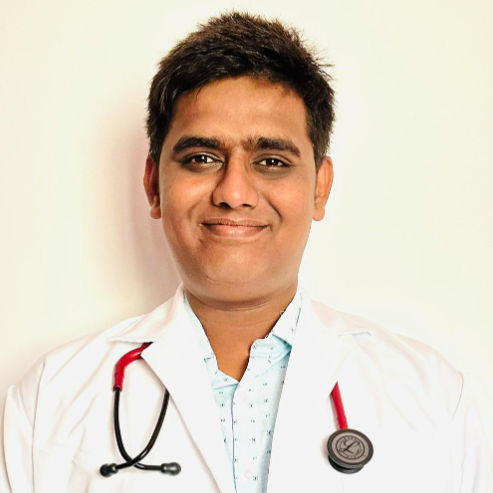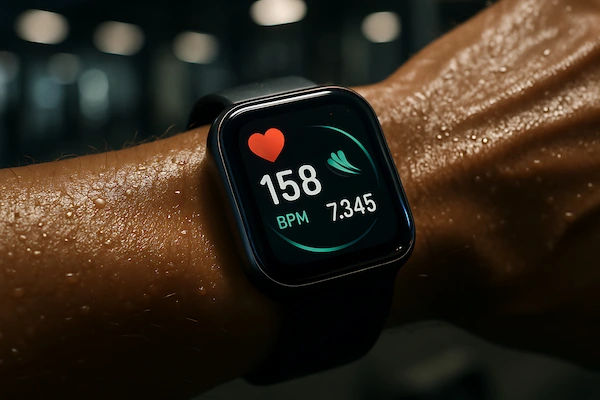Guide to Hypertensive Heart Disease
Learn everything about hypertensive heart disease, including its causes, risk factors, symptoms, diagnosis, treatment options, and effective prevention strategies for a healthy heart.

Written by Dr. Shaik Abdul Kalam
Reviewed by Dr. Rohinipriyanka Pondugula MBBS
Last updated on 13th Jan, 2026

Introduction
Have you been diagnosed with high blood pressure and worried about its long-term effects on your health? You're right to be concerned. Persistently high blood pressure, or hypertension, is a silent force that can gradually strain and damage your heart, leading to a serious condition known as hypertensive heart disease. This umbrella term encompasses a range of heart complications, including coronary artery disease, heart failure, and the thickening of the heart muscle itself. It's a leading cause of illness and death worldwide, but the most crucial fact to remember is that it is largely preventable and manageable. This comprehensive guide will walk you through everything you need to know about hypertensive heart disease—from understanding its root causes and recognising early warning signs to exploring modern treatment options and effective prevention strategies. Taking control of your blood pressure today is the most powerful step you can take to protect your heart for tomorrow.
What is Hypertensive Heart Disease?
Hypertensive heart disease refers to a group of heart disorders that occur as a direct result of long-standing high blood pressure. When your blood pressure is consistently high, your heart must work much harder than normal to pump blood throughout your body. This extra workload, sustained over months and years, causes structural and functional changes to the heart's muscles, valves, and arteries.
Think of it like this: if you constantly overwork any muscle, it will grow larger and thicker—a phenomenon known as hypertrophy. While this might be desirable for your biceps, it's problematic for your heart. A thicker heart muscle becomes stiffer and less efficient at pumping blood. Furthermore, high pressure damages the delicate lining of blood vessels, accelerating the buildup of fatty plaques (atherosclerosis), which narrows the arteries and reduces blood flow to the heart muscle.
The Link Between High Blood Pressure and Your Heart
The connection is direct and mechanical. Hypertension forces the heart to pump against significantly higher resistance in the arteries. This chronic pressure overload is the primary driver of the changes that define hypertensive cardiovascular disease.
Consult Top Specialists for Personalised Tips
Primary Causes and Risk Factors
The primary culprit behind hypertensive heart disease is no mystery: it is prolonged, uncontrolled high blood pressure. However, several factors can increase your risk of developing hypertension and, consequently, heart complications.
Uncontrolled High Blood Pressure (Hypertension)
This is the single most important risk factor. A blood pressure reading consistently at or above 130/80 mmHg is considered hypertensive and requires management. The longer your BP remains uncontrolled, the greater the strain on your heart.
Contributing Risk Factors You Should Know
While hypertension is the main cause, other factors can compound your risk:
- Age: The risk increases as you get older.
- Family History: A genetic predisposition to hypertension or heart disease.
- Obesity: Excess weight forces your heart to work harder to supply blood to additional tissue.
- Sedentary Lifestyle: Lack of exercise contributes to weight gain and poor cardiovascular health.
- Smoking: Damages blood vessel walls and accelerates atherosclerosis.
- High-Sodium Diet: Contributes to fluid retention and increased blood pressure.
- Excessive Alcohol Consumption: Can raise blood pressure directly.
- Sleep Apnea: This disorder is strongly linked to resistant hypertension.
- Chronic Stress: Can lead to behaviours and hormonal changes that increase BP.
Recognising the Symptoms of Hypertensive Heart Disease
Often, hypertensive heart disease develops silently for years. Symptoms typically only appear once the heart has sustained significant damage. The symptoms can vary depending on the specific complication that has developed.
Symptoms Related to Coronary Artery Disease
When hypertension leads to narrowed arteries, you may experience:
- Chest pain or discomfort (angina), often triggered by physical or emotional stress.
- Shortness of breath during exertion.
- A feeling of pressure, tightness, or squeezing in the chest.
Symptoms of Heart Failure
If the heart becomes too weak or too stiff to pump effectively, symptoms include:
- Shortness of breath (dyspnea), especially when lying flat (orthopnea) or at night (paroxysmal nocturnal dyspnea).
- Persistent coughing or wheezing with white or pink blood-tinged phlegm.
- Fatigue and weakness even during simple activities.
- Swelling (edema) in the legs, ankles, and feet.
- Rapid or irregular heartbeat.
- Reduced ability to exercise.
Symptoms of Left Ventricular Hypertrophy (LVH)
LVH itself may not cause symptoms initially, but as it progresses, it can lead to:
- Chest pain (especially during exercise).
- Heart palpitations or a feeling of a pounding heartbeat.
- Dizziness or fainting.
If you experience any of these symptoms, especially chest pain, severe shortness of breath, or fainting, it is a medical emergency. Consult a doctor online immediately with Apollo24|7 for urgent evaluation or seek emergency care.
How is Hypertensive Heart Disease Diagnosed?
Diagnosis typically involves a multi-step process to confirm the presence of heart damage and link it to hypertension.
Physical Exam and Medical History
Your doctor will listen to your heart and lungs for sounds of congestion or murmurs, check for swelling in your extremities, and thoroughly review your blood pressure history and symptoms.
Key Diagnostic Tests and Procedures
Blood Pressure Monitoring: Ambulatory monitoring (wearing a device for 24 hours) may be used to get a complete picture.
- Electrocardiogram (ECG/EKG): Measures the heart's electrical activity and can detect signs of LVH or arrhythmias.
- Echocardiogram: This is the gold standard for diagnosing hypertensive heart disease. This ultrasound provides detailed images of the heart's structure and function, clearly showing wall thickness, chamber size, and pumping efficiency.
- Stress Test: Assesses how your heart performs under physical exertion.
- Blood Tests: To check for biomarkers of heart strain, like BNP (B-type natriuretic peptide), and to rule out other causes like thyroid issues.
- Chest X-ray: Can show an enlarged heart or fluid in the lungs.
Apollo24|7 offers convenient home collection for tests like BNP and other crucial biomarkers, making it easier to get the diagnostics you need without multiple trips to a lab.
Effective Treatment Strategies and Management
The goal of treatment is twofold: to aggressively manage blood pressure to prevent further damage and to treat the specific heart complications that have already occurred.
Lifestyle Modifications: Your First Line of Defense
- This is non-negotiable and forms the foundation of all treatment.
- DASH Diet: Adopt a diet rich in fruits, vegetables, whole grains, and lean proteins, and low in sodium, saturated fat, and added sugars.
- Regular Exercise: Aim for at least 150 minutes of moderate-intensity aerobic activity per week (e.g., brisk walking, cycling).
- Weight Management: Losing even 5-10% of your body weight can significantly lower blood pressure.
- Sodium Reduction: Limit intake to less than 2,300 mg per day (ideally 1,500 mg for most adults).
- Limit Alcohol and Quit Smoking.
Medications to Control Blood Pressure and Protect the Heart
Your doctor may prescribe one or more of the following:
- ACE Inhibitors or ARBs: Relax blood vessels and are particularly protective for the heart.
- Beta-Blockers: Slow the heart rate and reduce the force of contraction.
- Diuretics: Help the kidneys remove excess sodium and water, reducing blood volume.
- Calcium Channel Blockers: Relax blood vessels.
Additional medications like digoxin (to strengthen contractions) or antiarrhythmics may be used for heart failure or irregular rhythms.
Surgical Procedures and Devices for Advanced Cases
In severe cases, treatments may include:
- Coronary Artery Bypass Grafting (CABG): For severely blocked arteries.
- Valve Repair or Replacement: If hypertension has damaged a heart valve.
- Pacemaker or ICD (Implantable Cardioverter-Defibrillator): To regulate heart rhythm.
Preventing Hypertensive Heart Disease
Prevention is entirely possible and centers on controlling your blood pressure before it can damage your heart.
Monitoring and Managing Your Blood Pressure
Know your numbers. Get your blood pressure checked regularly. If you have hypertension, work closely with your doctor on a management plan and take all prescribed medications consistently.
Heart-Healthy Lifestyle Choices
The same lifestyle changes used for treatment are your best tools for prevention. Embracing a heart-healthy lifestyle from a young age is the most effective strategy to avoid hypertensive cardiovascular disease altogether.
Living with Hypertensive Heart Disease
A diagnosis can be frightening, but with proper management, you can live a full and active life.
Long-Term Outlook and Prognosis
The prognosis depends heavily on how early the condition is diagnosed and how well blood pressure is controlled thereafter. With strict adherence to treatment and lifestyle changes, the progression of the disease can often be halted or significantly slowed.
The Importance of Regular Follow-Up Care
Ongoing care is critical. This includes regular doctor visits to monitor your heart function, adjust medications as needed, and manage any emerging symptoms. If your condition does not improve after trying these methods, book a physical visit to a doctor with Apollo24|7 for a comprehensive in-person evaluation and tailored long-term management plan.
Conclusion
Hypertensive heart disease underscores a powerful truth in medicine: prevention is profoundly better than cure. This condition, born from the silent, persistent strain of high blood pressure, is a formidable challenge but not an invincible one. By understanding the risks, recognising the potential warning signs, and taking proactive ownership of your cardiovascular health, you hold the key to safeguarding your heart's future. It begins with knowing your numbers, embraces the daily choices of a healthy lifestyle, and is sustained through partnership with a trusted healthcare provider. Don't wait for symptoms to speak—often, they do so too late. Take action today to manage your blood pressure and protect your most vital muscle for all the tomorrows to come.
Consult Top Cardiologists
Consult Top Specialists for Personalised Tips
Dr. Praveen Jaiswal
Cardiologist
17 Years • MD(Medicine), DM(Cardiology)
Indore
Apollo Hospitals Vijay Nagar, Indore

Dr. Shanmuga Sundaram D
Cardiologist
8 Years • MBBS, MD (GM), DNB Cardio
Chennai
Apollo Speciality Hospitals OMR, Chennai
(50+ Patients)

Dr. Sumanjita Bora
Cardiologist
9 Years • MBBS, PGDCC
Bengaluru
Apollo Clinic, Sarjapur Road, Bengaluru

Dr. Sushith C
General Physician
2 Years • MBBS
Bengaluru
PRESTIGE SHANTHINIKETAN - SOCIETY CLINIC, Bengaluru

Dr. Sarita Rao
Cardiologist
17 Years • MBBS, DM (Cardiology)
Indore
Apollo Hospitals Vijay Nagar, Indore
Consult Top Cardiologists
Dr. Praveen Jaiswal
Cardiologist
17 Years • MD(Medicine), DM(Cardiology)
Indore
Apollo Hospitals Vijay Nagar, Indore

Dr. Shanmuga Sundaram D
Cardiologist
8 Years • MBBS, MD (GM), DNB Cardio
Chennai
Apollo Speciality Hospitals OMR, Chennai
(50+ Patients)

Dr. Sumanjita Bora
Cardiologist
9 Years • MBBS, PGDCC
Bengaluru
Apollo Clinic, Sarjapur Road, Bengaluru

Dr. Sushith C
General Physician
2 Years • MBBS
Bengaluru
PRESTIGE SHANTHINIKETAN - SOCIETY CLINIC, Bengaluru

Dr. Sarita Rao
Cardiologist
17 Years • MBBS, DM (Cardiology)
Indore
Apollo Hospitals Vijay Nagar, Indore
More articles from Hypertensive heart disease
Frequently Asked Questions
What is the life expectancy of someone with hypertensive heart disease?
There is no fixed number. Life expectancy varies dramatically based on age, the severity of heart damage at diagnosis, and, most importantly, how well blood pressure is controlled afterward. With excellent management, many people live a long and full life.
Can hypertensive heart disease be reversed?
While some early changes like mild LVH may be partially reversible with extremely strict blood pressure control, the goal of treatment is typically to stop or slow progression and manage symptoms. The damage from advanced heart failure is often permanent, making early intervention critical.
What is the difference between hypertensive heart disease and congestive heart failure?
Hypertensive heart disease is the broad term for heart problems caused by high BP. Congestive heart failure (CHF) is a specific type of heart failure, often a result of hypertensive heart disease, where the heart can't pump effectively, causing fluid to 'congest' the lungs and other tissues.
What are the first signs of heart disease from high blood pressure?
The very first signs are often silent. The earliest detectable signs are usually found on tests like an EKG or echocardiogram before symptoms appear. The first noticeable signs might be subtle shortness of breath during routine activity or unusual fatigue.
What is the best diet for hypertensive heart disease?
The DASH (dietary approaches to stop hypertension) diet is consistently ranked as one of the best. It emphasises fruits, vegetables, whole grains, lean poultry, fish, and nuts, while being low in sodium, saturated fats, and sweets.

.webp)